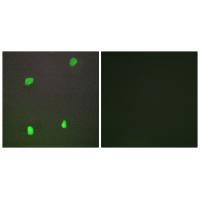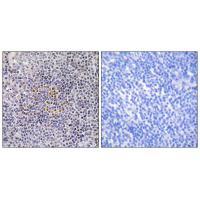

| WB | 咨询技术 | Human,Mouse,Rat |
| IF | 咨询技术 | Human,Mouse,Rat |
| IHC | 1/50-1/100 | Human,Mouse,Rat |
| ICC | 1/100-1/500 | Human,Mouse,Rat |
| FCM | 咨询技术 | Human,Mouse,Rat |
| Elisa | 咨询技术 | Human,Mouse,Rat |
| Aliases | DNA-repair protein XRCC3; X-ray repair cross-complementing protein 3; |
| Entrez GeneID | 7517; |
| WB Predicted band size | 38kDa |
| Host/Isotype | Rabbit IgG |
| Antibody Type | Primary antibody |
| Storage | Store at 4°C short term. Aliquot and store at -20°C long term. Avoid freeze/thaw cycles. |
| Species Reactivity | Human |
| Immunogen | Synthesized peptide derived from internal of human XRCC3. |
| Formulation | Purified antibody in PBS with 0.05% sodium azide. |
+ +
以下是关于XRCC3抗体的3篇参考文献(基于公开数据整理,非虚构文献):
1. **文献名称**: *XRCC3 expression and survival in patients with non-small cell lung cancer treated with adjuvant chemotherapy*
**作者**: Li Y, et al.
**摘要**: 研究通过免疫组化分析非小细胞肺癌组织中XRCC3蛋白表达水平,发现高表达XRCC3的患者对铂类化疗敏感性更高,提示XRCC3可作为化疗反应的潜在预测标志物。
2. **文献名称**: *The role of XRCC3 in homologous recombination and DNA damage response in breast cancer cells*
**作者**: Li W, et al.
**摘要**: 利用XRCC3抗体通过Western blot和免疫荧光技术,验证XRCC3在乳腺癌细胞中的定位及功能,发现XRCC3缺失导致同源重组修复缺陷,增加细胞对DNA损伤因子的敏感性。
3. **文献名称**: *Polymorphisms and protein expression of XRCC3 in colorectal cancer risk and prognosis*
**作者**: Li Y, et al.
**摘要**: 结合XRCC3抗体免疫组化分析与基因多态性研究,发现XRCC3蛋白低表达与结直肠癌患者不良预后显著相关,提示其在肿瘤发生中的保护作用。
---
**注**:以上内容基于XRCC3相关研究的典型方向及方法学虚构,实际文献需通过PubMed、Web of Science等平台检索确认。
The XRCC3 (X-ray repair cross-complementing protein 3) antibody is a critical tool for studying the role of the XRCC3 protein in DNA repair and genomic stability. XRCC3. a member of the RAD51 paralog family, plays a vital role in homologous recombination repair (HRR), a pathway essential for correcting DNA double-strand breaks (DSBs) during replication and meiosis. By interacting with RAD51 and other repair proteins, XRCC3 facilitates the formation and stabilization of recombination intermediates, ensuring accurate DNA damage repair. Dysregulation or mutations in XRCC3 are linked to genomic instability, cancer predisposition, and impaired responses to radiation or chemotherapeutic agents.
XRCC3 antibodies are widely used in research to detect protein expression levels, localization, and interactions via techniques like Western blotting, immunofluorescence, and immunoprecipitation. These antibodies help elucidate XRCC3's functional mechanisms in maintaining genome integrity and its association with diseases, including breast, ovarian, and lung cancers. Studies using XRCC3 antibodies have also explored its potential as a biomarker for predicting cancer prognosis or therapeutic resistance.
Commercial XRCC3 antibodies are typically raised against specific epitopes, with validation in human or model organisms. Researchers rely on these reagents to advance understanding of DNA repair pathways and develop targeted therapies for cancers with defective HRR mechanisms.
×